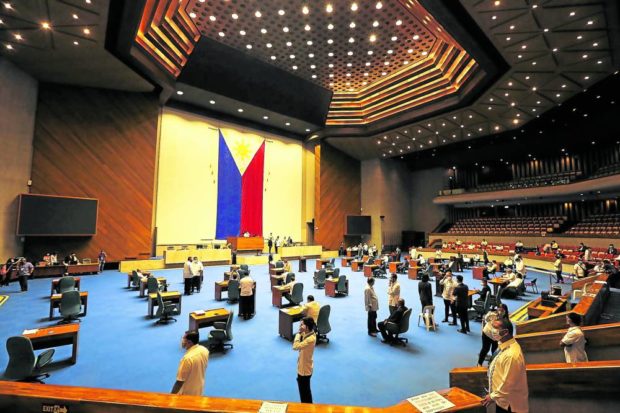House panel OKs substitute bill to proposed PH Building Act

House of Representatives FILE PHOTO
MANILA, Philippines — A committee in the House of Representatives has approved the substitute bill to the proposal that seeks to establish a Philippine Building Act (PBA) to ensure the safety of structures across the country.
During the hearing of the House committee on public works and highways on Wednesday, the still unnumbered bill consolidates House Bills (HB) No. 815, 1180, 1205, 1207, 1409, 2392, 3442, 3686, and 7218, all of which also push for the creation of a 30-year National Infrastructure Program (NIP).
If the bill is enacted, a new system of classification of buildings, zoning, fire requirements, environment protection, and design requirements will be enshrined.
The proposal would also place general requirements for construction safety and building materials alongside new inspection guidelines. Also, a National Building Office tasked to craft rules, approve changes to building standards, and issue orders on demolition will be created.
“The bill will provide for the minimum standards for the regulation of location, planning, design, construction, occupancy, maintenance, and demolition of buildings, the establishment of a permitting process based on their classifications, and the setting of reference standards,” committee chair and Surigao del Sur Rep. Romeo Momo Sr., author of HB No. 3442, said in the bill’s explanatory note.
Article continues after this advertisementMomo, who also presided over the hearing, said that the bills pushing for the PBA and the NIP are “landmark legislation”.
Article continues after this advertisement“This is going to be a landmark legislation indeed,” he said in his preliminary remarks.
Momo said that the bill should be deliberated now, saying that the current National Building Code is already old and enacted in the 1970s.
Bulacan 6th District Rep. Salvador Pleyto also appealed that the bill be approved. The substitute bill aims to provide the much-needed roadmap for safe, efficient, and environment-friendly infrastructure planning.
“This bill has been aligned to the policies and programs of the new Philippine development plan for 2023 up to 2028 as approved by NEDA [National Economic and Development Authority] and President Ferdinand Marcos Jr. himself,” he said.
“It also provides the long-term framework that will seamlessly interconnect our medium and annual infrastructure programs and therefore provide for continuity in its infrastructure development across different administrations,” he added.
This is not the first time that a review or a revision of the old building code was suggested: as early as 2013, renowned architect Felino Palafox Jr. said that the new building code should also take into consideration a structure’s capability to withstand disasters, considering that the Philippines experiences calamities regularly.
READ: Review of PH building code pushed
Former senator Panfilo Lacson in 2019 also filed a similar bill establishing a Philippine Building Act, but it was not enacted due to time constraints and the COVID-19 pandemic hitting the country the year after.
READ: Stronger building standards pushed
READ: Bong Go refiles proposed enhanced Philippine Building Act
In 2021, a local company that makes structural integrity monitoring systems warned the country to remember that aside from the COVID-19 pandemic, earthquakes are a looming danger, which means that the government and the public must also prepare for the worst-case scenario.
READ: As pandemic grips PH, Filipinos reminded to prepare for another disaster—quakes